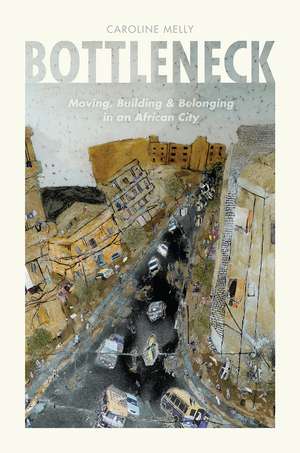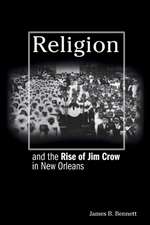Bottleneck: Moving, Building, and Belonging in an African City
Autor Caroline Mellyen Limba Engleză Paperback – 2 noi 2017
In Bottleneck, anthropologist Caroline Melly uses the problem of traffic bottlenecks to launch a wide-ranging study of mobility in contemporary urban Senegal—a concept that she argues is central to both citizens' and the state's visions of a successful future.
Melly opens with an account of the generation of urban men who came of age on the heels of the era of structural adjustment, a diverse cohort with great dreams of building, moving, and belonging, but frustratingly few opportunities to do so. From there, she moves to a close study of taxi drivers and state workers, and shows how bottlenecks—physical and institutional—affect both. The third section of the book covers a seemingly stalled state effort to solve housing problems by building large numbers of concrete houses, while the fourth takes up the thousands of migrants who attempt, sometimes with tragic results, to cross the Mediterranean on rickety boats in search of new opportunities. The resulting book offers a remarkable portrait of contemporary Senegal and a means of theorizing mobility and its impossibilities far beyond the African continent.
Melly opens with an account of the generation of urban men who came of age on the heels of the era of structural adjustment, a diverse cohort with great dreams of building, moving, and belonging, but frustratingly few opportunities to do so. From there, she moves to a close study of taxi drivers and state workers, and shows how bottlenecks—physical and institutional—affect both. The third section of the book covers a seemingly stalled state effort to solve housing problems by building large numbers of concrete houses, while the fourth takes up the thousands of migrants who attempt, sometimes with tragic results, to cross the Mediterranean on rickety boats in search of new opportunities. The resulting book offers a remarkable portrait of contemporary Senegal and a means of theorizing mobility and its impossibilities far beyond the African continent.
Preț: 236.83 lei
Nou
Puncte Express: 355
Preț estimativ în valută:
45.33€ • 49.26$ • 38.10£
45.33€ • 49.26$ • 38.10£
Carte tipărită la comandă
Livrare economică 21 aprilie-05 mai
Preluare comenzi: 021 569.72.76
Specificații
ISBN-13: 9780226488905
ISBN-10: 022648890X
Pagini: 224
Ilustrații: 11 halftones
Dimensiuni: 152 x 229 x 15 mm
Greutate: 0.3 kg
Ediția:1
Editura: University of Chicago Press
Colecția University of Chicago Press
ISBN-10: 022648890X
Pagini: 224
Ilustrații: 11 halftones
Dimensiuni: 152 x 229 x 15 mm
Greutate: 0.3 kg
Ediția:1
Editura: University of Chicago Press
Colecția University of Chicago Press
Notă biografică
Caroline Melly is associate professor of anthropology at Smith College.
Cuprins
Acknowledgments
Introduction / Embouteillage
One / Making Mobility Matter
Two / Trafficking Visions
Three / Inhabiting Inside-Out Houses
Four / The Adjusted State in the Meantime
Five / Telling Tales of Missing Men
Conclusion / Embouteillage and Its Limits
References
Index
Introduction / Embouteillage
One / Making Mobility Matter
Two / Trafficking Visions
Three / Inhabiting Inside-Out Houses
Four / The Adjusted State in the Meantime
Five / Telling Tales of Missing Men
Conclusion / Embouteillage and Its Limits
References
Index
Recenzii
“Bottleneck is a joy to read and a sophisticated ethnography. Melly’s examination of globalization situates Dakar and Senegal at the crossroads of long-standing relations of migration and mobility. She examines the implications of the well known Muriddiya from a completely fresh perspective, working within Senegal’s national development administration in order to grasp movement and mobility at a range of levels—as a national value, a total social fact, and a material condition. Melly’s ability to wed these perspectives makes for a unique contribution to our understanding of these processes. This book is a significant accomplishment.”
“Using the phenomenon of embouteillages—or bottlenecks—as a literal and metaphorical entry point, Melly shows how overlapping circuitries of movement and the blockages that impede them are central to political-economic and cultural processes in this African city. She combines rich ethnography with innovative theorizing to produce superb scholarship in anthropology and African studies, and contributes significantly to understanding a range of intersecting issues including statecraft, development, urbanization, migration, gender, and an emerging anthropology of infrastructure.”




